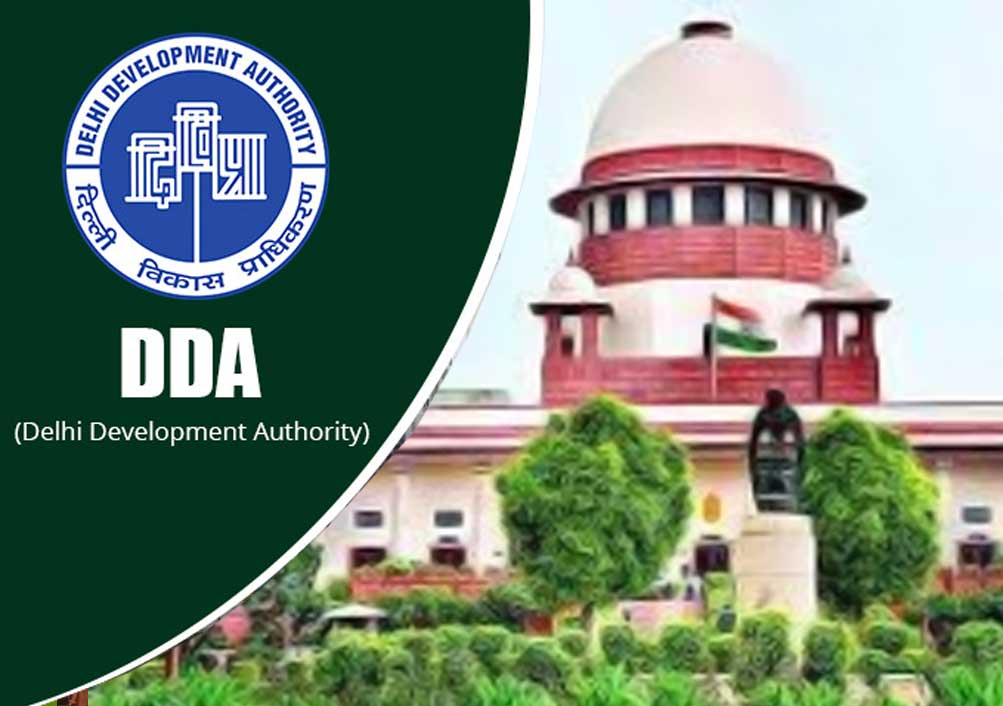Delhi Development Authority is statutory and autonomous organization; Any revision of pay-structure or revision in other terms and conditions of Central Govt. personnel do not automatically apply to it: SC

Read Judgment: The Vice Chairman Delhi Development Authority V. Narender Kumar & Ors.
Pankaj Bajpai
New Delhi, March 9, 2022: While considering the eligibility of the employees of Delhi Development Authority (DDA) for the second up-gradation pursuant to the issuance of Modified Assured Career Progression Scheme (MACP) vis-à-vis entitlement to an up-gradation under the old Assured Career Progression Scheme (ACP), the Supreme Court has opined that a set of employees, who might have benefitted from the then prevailing regime or policy, cannot in the absence of strong and unequivocal indications in the later policy (which might be given effect to from an anterior date), insist that they have a right to be given the benefits under the superseded policy.
The Top Court noted that DDA is an autonomous and statutory organization. It largely follows the Central Government’s policies, in respect of pay and allowances, and other benefits for its employees. However, any revision of pay-structure or revision in other terms and conditions, of Central Government personnel cannot and do not automatically apply to the DDA; it has to consider the new or fresh scheme formulated by the Central Government, and adopt it, if necessary, after appropriate adaptation, to suit its needs. Therefore, the Central Government’s MACP scheme did not apply to it automatically.
A Larger Bench of Justice Uday Umesh Lalit, Justice S. Ravindra Bhat and Justice Bela M. Trivedi observed that to insist that a particular kind of benefit, hitherto applicable, should be continued for a set of employees, while the others should be governed by another, new set or scheme, would be imposing a significant burden on the administration, apart from swelling financial costs as well as administrative energies.
Going by the background of the case, the Government of India introduced the Assured Career Progression Scheme (ACP Scheme) by an office memorandum in August, 1999, to remove stagnation. By a resolution, the recommendations of the Central Pay Commission concerning civilian employees were accepted by the Central Government with respect to revised scales of pay and dearness allowances. The Central Government, in supersession of the ACP Scheme, introduced the MACP scheme, by an office memorandum in May, 2019.
The respondent employees had been appointed as regular Work Charged Malis, by the DDA, with effect from various dates, beginning from January 3, 1985 and they were granted the first financial up-gradation under the ACP Scheme on completion of 12 years of regular service. Subsequently, they became eligible for grant of the second financial up-gradation under the ACP Scheme upon completion of 24 years of service. This benefit was, however, not given to them by DDA.
The employees’ grievance was that the DDA introduced the MACP scheme by an order dated October 6, 2009 and according to them, as their eligibility to claim the second ACP benefit had accrued to them earlier, they should have been granted the benefit of second ACP. Consequently, they approached the Central Administrative Tribunal (CAT).
The CAT allowed the applications preferred by the employees and directed DDA to consider their cases for granting of the financial up-gradations under the ACP Scheme till the date of issuance of the MACP Scheme, if they were otherwise qualified and eligible, and to grant appropriate pay scales accordingly, with all consequential benefits. Arrears were, however, denied to the employees. On appeal, the High Court directed that MACP benefits should be extended to the employees of DDA from January 1, 2006.
After considering the submissions, the Top Court found that both the decisions in case of Union of India v. M.V. Mohanan Nair, (2020) 5 SCC 421, and Union of India v. R.K. Sharma & Ors., (2021) 5 SCC 579, had examined the MACP scheme and ruled that the scheme was operable from September 1, 2008, and the respondent officers were not entitled to seek implementation of the benefits of MACPS with effect from January 1, 2006 according to the Resolution dated August 29, 2008.
The Top Court therefore observed that mere circumstance that the resolution of the Government which led to adoption of the MACP also contained the effective date for implementation of the pay-benefits of the Pay Commission recommendations, did not obliterate the fact that the date from which the scheme was to be made effective, was another one.
The submissions of the DDA, that the executive agency’s considerations, while extending a benefit or new regime such as the promotion or career advancement program, is to be effective, involves decision making that is complex and nuanced, is justified, added the Court.
“In the present context, none of the employees actually earned a second financial up-gradation. They undoubtedly became eligible for consideration. However, the eligibility ipso facto could not, having regard to the terms of the ACP scheme translate into an entitlement. The eligibility was, to put it differently, an expectation. To be entitled to the benefits, the public employer (here DDA) had to necessarily review and consider the employees’ records, to examine whether they fulfilled the eligibility conditions and, based on such review individual orders had to be made by DDA”, added the Bench.
Accordingly, the Apex Court allowed the appeals filed by the DDA and concluded that the benefits claimed by such of the applicant/employees, granted to them under the ACP scheme, can be reversed by the DDA.
Sign up for our weekly newsletter to stay up to date on our product, events featured blog, special offer and all of the exciting things that take place here at Legitquest.




Add a Comment